ZEN MESTEREK ZEN MASTERS
« Zen főoldal
« vissza a Terebess Online nyitólapjára

Howard Fast (1914-2003)
Howard Fast began to formally practice Zen meditation after turning away from communism in 1956. The Art of Zen Meditation, originally published by the antiwar political collective Peace Press in 1977, is the fruit of Fast's study: a brief and instructive history of Zen Buddhism and its tenets, written with a simplicity that is emblematic of the philosophy itself. Fast's study of Zen also inspired his popular Masao Masuto mystery series about a Zen Buddhist detective in Beverly Hills, which he published under the pseudonym E. V. Cunningham.
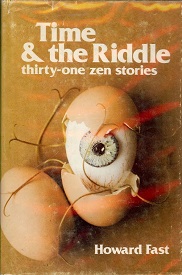
PDF: Time and the riddle: thirty-one Zen stories
Ward Ritchie Press, 1975
Boston: Houghton Mifflin, 1980
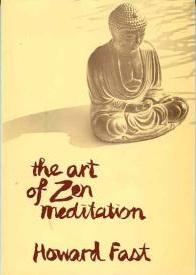
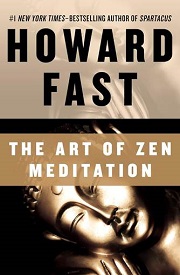
The Art of Zen Meditation
Culver City, Calif.: Peace Press, "First Edition", 1977, 45 p.
Open Road Media, New York, 2011, 71 p.
Howard Fast began to formally practice Zen meditation after turning away from communism in 1956. The Art of Zen Meditation, originally published by the antiwar political collective Peace Press in 1977, is the fruit of Fast’s study: a brief and instructive history of Zen Buddhism and its tenets, written with a simplicity that is emblematic of the philosophy itself. Fast’s study of Zen also inspired his popular Masao Masuto mystery series about a Zen Buddhist detective in Beverly Hills, which he published under the pseudonym E. V. Cunningham. The Art of Zen Meditation is illustrated with twenty-three beautiful photographs. This ebook features an illustrated biography of Howard Fast including rare photos from the author’s estate.
The Masao Masuto Mysteries:
https://www.trussel.com/hf/masuto.htm
Howard Fast wrote mysteries as E.V. Cunningham, including this series of seven starring Masao Masuto, a nisei detective with the Beverly Hills, California, Police Department... devotee of rose cultivation and Zen meditation. Fast lived six years in California, practiced Zen meditation, and wrote a small book about it.
Vol. I. PDF
1. Samantha, AKA The Case of the Angry Actress (1967)
2. The Case of the One-Penny Orange (1977)
3. The Case of the Russian Diplomat (1978)
4. The Case of the Poisoned Eclairs (1979)Vol. II. PDF
5. The Case of the Sliding Pool (1981)
6. The Case of the Kidnapped Angel (1982)
7. The Case of the Murdered Mackenzie (1984)
Fast's Zen meditation and the Masao Masuto series
Andrew Macdonald, Howard Fast: A Critical Companion, pp 31-33
... Although the California years were clearly enjoyable and stimulating at the time, Fast recently remarked that he has never missed the West Coast because the California he knew then is dead and gone; in fact, every time he has visited there since leaving, he has disliked it more, a result of overpopulation, pollution, and a rape of the natural beauty and purity that attracted people there in the first place. But one influence has remained with Fast, and it is related to his split with the party: the influence of Zen Buddhism.
After rejecting communism, Fast studied Zen formally for eight years. That philosophy, of course, is not necessarily related to a particular place, but the Masao Masuto books illustrate the connection of the discipline with California. Fast calls his study "very important" even now, living long after in the environs of New York City. Zen provides a context for the moral issues that have consumed Fast's attention all his life. Also, Zen stresses a form of unconventionality – the student of Zen is not allowed to give an expected or conventional answer to an assigned koan, or puzzle – that is an obvious Fast characteristic. But Fast stresses that after living much of his adult life with the socialist framework providing direction and answers to the puzzling questions of existence, one does not simply give it over and move on easily. Zen provided an "ability to focus, to center ... [his] life" that was invaluable then, in the difficult years after the party, and now. Fast clearly still believes in the humanist principles that underlie a good deal of socialist thought, but the loss of party discipline and structure must have involved a true crisis for a writer fond of clarity and order. Zen provided such a focus, and we may not be reading too much into the Masao Masuto books if we think of both their hero (a lean, six-foot-tall Nisei attached to the Beverly Hills Police Department) and their author as outsiders, somewhat alienated by perspective from the majority culture in which they must operate, but finding their center through Zen meditation.
Masuto, like Fast, finds in the Zen meditative philosophy the calm, the self-assurance, and the introspective insights necessary to carry out his work, and, again like Fast, he empathizes with the common worker, despite the wealthy environment in which he works. Like Fast, Masuto cultivates the yin and the yang, loves roses and the exquisite calm of the tea ceremony, and has fond memories of the peaceful and productive farm life of the San Fernando of bygone years, the romantic agrarianism that runs through so many of Fast's books. Like his creator, Masuto has an American maverick streak beneath his surface Zen serenity: his independent thinking and contempt for overbearing authority. Reflecting his creator, Masuto says, "I try not to respond to fools (The Case of the Russian Diplomat 65). Masuto speaks Spanish as well as Japanese (Fast does not), and he sometimes faces cruel taunts about his nisei heritage, but just as Fast survived similar attacks because of his Jewish background, he has learned to cope with the crass lifestyles and acid tongues of southern Californians.
Fast says that he enjoyed writing the Masuto detective novels because the use of a pseudonym (E. V. Cunningham, a name suggested by his agent, Paul Reynolds) gave him a sense of freedom that allowed him to toy with ideas for pleasure and to write in a style and with a focus quite different from what he had done before; he describes the experience as "captivating" and his results "half-serious." He could have his hero share his pet peeves (for instance, California funeral homes in The Case of the Murdered Mackenzie), battle his favorite villains (the S.S. in The Case of the One-Penny Orange, former Nazis in The Case of the Russian Diplomat, and the CIA, which fixes evidence and phony charges and condones double murder, in The Case of the Murdered Mackenzie), and reflect values dear to him, including a deep distrust of any group that tries to repress the individual, force the human into mechanical categories, or deny genuine emotion.
The detective hero Masuto combines Buddhist meditation with Holmesian ratiocination to make intuitive leaps of both reason and imagination that leave his colleagues and superiors puzzling over the assumptions that further investigation, physical evidence, and testimony confirm. The close observation that allows the Buddhist in Masuto to see beauty where others see ugliness also allows him to see the mundane, the corrupt, and the repulsive behind the beautiful facade of Beverly Hills. These stories look at the wealthy California scene from the perspective of an outsider, racially, culturally, and economically. Masuto can bring Asian perceptions to unraveling the mysteries of his adopted community and counters the mainstream disintegration of family values with his own deep-seated commitment to home and family. His son and daughter are quiet, obedient, and respectful, and his Japanese-American wife, Kati, though at times truly Californian (she participates in consciousness-raising sessions), observes traditional Japanese customs and rituals (providing hot baths, fine cuisine, and soothing solace) to help him recuperate from the conflicts of his job.
Fast's mystery plots, which occupied his thoughts throughout the late 1970s and early 1980s, are amusing puzzles, but they have political undercurrents. In The Case of the One-Penny Orange, for example, Masuto penetrates the link between seemingly unconnected events (a local burglary, a murdered stamp dealer, and a missing S.S. commander) with an 1847 Mauritius one-penny stamp worth half a million dollars and a revenge ritual that originated in the bitterness of the Holocaust, while in The Case of the Russian Diplomat, fascistic Arab and East German terrorists assassinate a Russian diplomat and plan to sabotage an airplane full of Soviet agronomists, all to undermine the Jewish Defense League. In The Case of the Sliding Pool, powerful financial and industrial speculators play games with people's lives, impede Masuto's investigation, and break rules with impunity, while The Case of the Poisoned Eclairs explores the uglier costs of wealth in marriage and divorce. Fast's Masuto believes that crime encapsulates the general illnesses of humanity and is an affront to human dignity and conscience. A Buddhist involved with humanity but faced with the materialism, corruption, and inhumanity of the Beverly Hills rich, he must constantly battle external political pressure to limit or even end his investigation and the internal hatred that discovering evil makes him feel. His family is vital to providing the moral and emotional foundation necessary for Masuto to carry on in a society and culture that attacks his values.
The Case of the Angry Actress
first published as Samantha
Wm. Morrow & Co., 1967
from the dust jacket of the 1967 William Morrow first editionAs Detective Sergeant Masao Masuto of the Beverly Hills Police Force drives toward the great antebellum-type house on North Canon, he thinks of his friend Al Greenberg, a famous producer. He recalls how far Greenberg had traveled, from the anonymous, crowded world of Bensonhurst in Brooklyn to the great house and the dreams and dolce vita of Hollywood.
Now Al Greenberg is dead. Almost from the moment his body is found in his Beverly Hills bedroom, a coterie of top film stars and executives suspect that they are marked for murder. The killer announces to one and all that her name is Samantha. Eleven years earlier a girl named Samantha – then one of thousands of young women seeking fame and stardom – was raped by half a dozen young men on a Hollywood set. The bait was the promise of a part in a TV show. She did not get the part and was never seen again. Now, one by one, the very same men who participated in the rape are meeting violent deaths.
It is up to Detective Masao Masuto to stop the killings and catch the killer. A Buddhist, aloof yet involved, a man of simple yet sophisticated tastes, Masuto must overcome the crass Hollywood world where a Nisei is still cruelly taunted. And Detective Masuto must decide, too, whether one of the beautiful, acid-tongued wives of those slated to die is Samantha.
A thriller calculated to bring you an interlude of fast-paced suspense, Samantha follows in the high-heeled footsteps of such favorites as Sally, Margie, Helen and Penelope.
The Case of the One-Penny Orange
Holt, Rinehart and Winston, 1977
from the dust jacket of the 1977 Holt, Rinehart, Winston first editionMasao Masuto, a Nisei detective on the Beverly Hills police force, is a karate expert, a devotee of roses, and a Zen Buddhist. He does his job with a cool, caustic wit, and force when necessary. He is a complex man with a singular sense of justice, taking action on his own and making moral judgments as he sees fit – not always by the code. He also happens to be superb as puzzling out a crime.
Here, in this first of a series, Masao is called in to check a ransacked house from which nothing has been taken. The same day a noted stamp dealer is found murdered in his office, and his assistant is beaten to death that night. Although Masao's chief rages about the transatlantic phone calls Masao demands and no one can fathom the tack he's taking, he quietly begins a search for a little square of reddish-orange paper, imperforate – an 1847 postage stamp from the island of Mauritius, now worth close to half a million dollars. It is one of the rarest, most famous stamps in the world.
Here is a mystery that offers not only an intriguing crime-puzzle but also a very human tale of greed and of ritual revenge whose origins lie in the bitter memories of the Holocaust and whose emotional undertones reflect harsh political and social truths. Masao as observer and actor in the drama – here as well as in all the books in the series – promises an unusual look at the luxury and corruption of life in L.A.
The Case of the Russian Diplomat
Holt, Rinehart and Winston, 1978
from the dust jacket of the 1978 Holt, Rinehart, Winston first editionMasao Masuto has a rose garden and practices Zen Buddhism. He is also the only Nisei detective in the Beverly Hills Police Department, a man who uses karate, not guns, and who brings to his job both a wry, reflective humor and an almost intuitive skill for the riddle of a crime. Here, in the second of a series featuring this complex man, Masao finds himself risking his job – and the life of his child Ana – on the strength of his guesses.
In the predawn hours an unidentified man is found in the lavish pool of the Beverly Glen Hotel – not a mark on the body. A few hours later a guest is murdered. By the time an officious F.B.I. agent has been dispatched from Washington to "handle" the case, Masuto is following his own leads into a world of espionage and terrorism.
As with The Case of the One-Penny Orange, the intriguing start to the Masao Masuto series, Cunningham shows us the cost of political hatreds while also offering, with humor and engaging style, a drama of monied L.A. and its seamier underpinnings – a tense and provocative mystery.
The Case of the Poisoned Eclairs
Holt, Rinehart and Winston, 1979
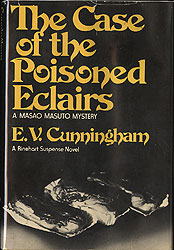
from the dust jacket of the 1979 Holt, Rinehart and Winston first editionSince they're all "dieting," the women in Laura Crombie's bridge group refuse the pastry that was delivered anonymously to her house. But Ana Fortez, Laura's maid, loves sweets, and she take the éclairs home. By dawn she is dead of botulism. And by the end of the day two more bodies are found – the boy who delivered the pastry and an ex-con chemist.
Masao Masuto, the brilliant, enigmatic Nisei detective on the Beverly Hills police force, is put on the case. He is a man who likes quiet pleasures, like tending his rose garden, and he brings to his job the skills of karate, the concentration of Zen Buddhism. Here he finds himself on the line from the beginning, as he tries to discover who the intended victim is, who the killer -- before another murder occurs. The four women he puts under guard are all divorcées, are in no mood to stay cooped up, despite their fear, and the men he questions are arrogant or noncommittal. No one is helping, yet Masao knows that the killer is a man obsessed with a secret that threatens him and that he's in a hurry to kill – no matter that others die in his pathological pursuit.
The Case of the Poisoned Eclairs is a tough, tense mystery, yet laced with Masao's ironic wit; it is also a hard look at some of the uglier costs of wealth in marriage and divorce.
The Case of the Sliding Pool
Delacorte Press, 1981
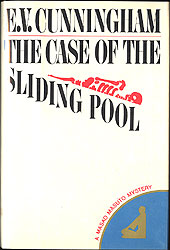
from the dust jacket of the 1981 Delacorte Press first editionIn his most baffling case yet, Masao Masuto, Beverly Hills's American-born Japanese detective, unearths a thirty-year-old murder, and in doing so, arouses a killer who will stop at nothing to put the case back to rest.
Its supports weakened by days of rain, a swimming pool collapses down a Beverly Hills canyon, exposing a neatly scooped-out cavity in the pool's foundation. In it the horrified owners find a thirty-year-old skeleton of a man.
Always sensitive to undesirable publicity, Captain Wainwright of the Beverly Hills police would be happy to drop the case after a perfunctory investigation. But Masuto, intrigued by the coroner's report, cannot let the matter rest. What could have been the motive for such a crime? Who could have had the expertise, and the physical strength, to kill a victim, strip him naked, and coolly bury him on a construction site?
For Masuto the first challenge is clear: ...identify the dead man. From there he can begin to piece together the killer's identity... assuming the man has survived the thirty years since his crime.
As Masuto begins his investigation, he finds himself locked in a deadly game of wits with a brilliant murderer -- who is still very much alive. The stakes rise as the killer strikes again, then once more, until Masuto devises a desperate plan to draw the killer into the open. But a shocking reversal lies waiting to serve Masuto up -- alone and unarmed -- to the ruthless murderer he has so diligently pursued.
The Case of the Kidnapped Angel
Delacorte Press, 1982
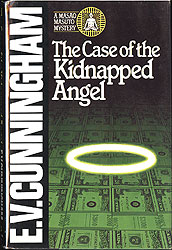
from the dust jacket of the 1982 Delacorte Press first editionIn his most puzzling mystery since The Case of the Sliding Pool, Detective Masao Masuto becomes entangled in the seamy underside of life in glittering Beverly Hills.
When Angel Barton, Hollywood sex goddess, is kidnapped from her Malibu beach house, Detective Masao Masuto is sent to investigate. But Mike Barton, Angel's equally famous actor husband, is adamant that the million-dollar ransom be paid -- without police interference. A few hours after Barton sets off to rendezvous with the kidnappers, Angel Barton returns home unharmed. Her husband is not so lucky: Mike Baron is found slumped behind the wheel of his Mercedes, a bullet in his head, the ransom money gone.
As Masuto begins to seek out the reasons for Barton's death, he finds himself immersed in a complex world of secret passions and bewildering illusions. More victims will die before Masuto gathers the suspects together in a desperate gamble to expose the vicious killer behind the smiling faces of Mike Barton's closest friends.
The Case of the Murdered Mackenzie
Delacorte Press, 1984Masao Masuto, that very shrewd Japanese detective on the Beverley Hills police force, whose brilliance we have already encountered in the cases of The Sliding Pool and The Kidnapped Angel, takes a long-promised holiday with his wife and daughter in the land of their ancestors. And as soon as he's gone, his partner Sy Beckman has to cope with an extraordinary murder problem.
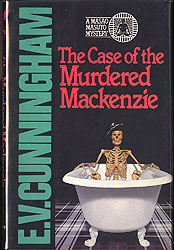
from the dust jacket of the 1985 Gollancz first UK edition
A leading local citizen, Robert Mackenzie, is found murdered, seemingly electrocuted in his bath, and the first of many curious things about the case is the pressure put upon the District Attorney and the Chief of Police, by powerful sources in Washington, to charge Mackenzie's wife (once a famous film star, and still beautiful) with the crime. Masuto returns to be faced by a fait accompli: the trial is about to begin, though the case against Eve Mackenzie is so flimsy that the judge is sure to dismiss the charge without even calling the defence. Which is what happens.
So: who killed Mackenzie; and why the clumsy attempt to implicate his wife? The police are instructed, again from Washington, to proceed no further, but Masuto obstinately goes on investigating. To him, murder remains murder, even if the White House wants to hush it up. But why hush it up, and by any desperate means, which include two more murders, and two very narrow escapes for Masuto himself. And who's behind it all? – the firm for which Mackenzie worked, the formidable Fenton Corporation, manufacturer of missile components? – or perhaps the devious CIA? Also, was the dead man really Mackenzie: reliable witnesses identified the body, but when Masuto forces an exhumation, the coffin is empty.
Before we reach the tense denouement we are into even deeper waters. Masuto has never had a more baffling problem, nor has he solved one more brilliantly – with a little help from his Zen meditation, of course!